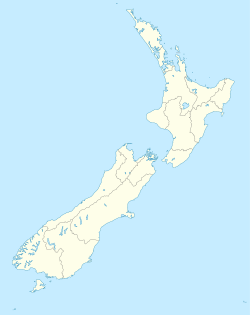Otorohanga, New Zealand
| Otorohanga | |
|---|---|
| Coordinates: 38°11′S 175°12′E / 38.183°S 175.200°ECoordinates: 38°11′S 175°12′E / 38.183°S 175.200°E | |
| Country |
|
| Region | Waikato |
| Territorial authority | Otorohanga District |
| Ward | Otorohanga |
| Electorate | Waikato |
| Government | |
| • Mayor | Max Baxter |
| Population (June 2016) | |
| • Total | 2,700 |
| Time zone | NZST (UTC+12) |
| • Summer (DST) | NZDT (UTC+13) |
| Postcode(s) | 3900 |
| Area code(s) | 07 |
Otorohanga is a north King Country town at the southern end of the Waikato region in the North Island of New Zealand. It is located 53 kilometres south of Hamilton and 18 kilometres north of Te Kuiti, on the Waipa River. It is a service town for the surrounding dairy farming district. It is recognised as the "gateway" to the Waitomo Caves and as the "Kiwiana Town" of New Zealand, and until 2007 held a yearly 'Kiwiana Festival.'
Otorohanga is part of, and the seat of, the Otorohanga District Council. Since the 2013 local elections, Max Baxter has been the mayor.
Otorohanga is internationally renowned for its local Kiwi House. The Kiwi House was the first place in the world where the general public could view a kiwi in captivity. Its visitor numbers have remained constant throughout the years, recording an average of 5,000 per month over 2007–2008. Although Otorohanga is internationally renowned for its Kiwi House, it also has a public library, a swimming complex, a Countdown Supermarket and a 24-hour McDonald's.
In 1986, the town briefly changed its name to "Harrodsville". This was a protest in support of a restaurateur, Henry Harrod of Palmerston North, who was being forced to change the name of his restaurant following the threat of lawsuits from Mohammed Al Fayed, the owner of Harrod's department store in London.
As a show of solidarity for Henry Harrod and in anticipation of actions against other similar-sounding businesses, it was proposed that every business in Otorohanga should change its name to "Harrods". With support of the District Council, Otorohanga temporarily changed the town's name to Harrodsville.
After being lampooned in the British tabloid newspapers, Al Fayed dropped the legal action and Harrodsville and its shops reverted to their former names. The town's response raised widespread media interest around the world, with the BBC World Service and newspapers in Greece, Saudi Arabia, Australia and Canada covering the story.
...
Wikipedia

